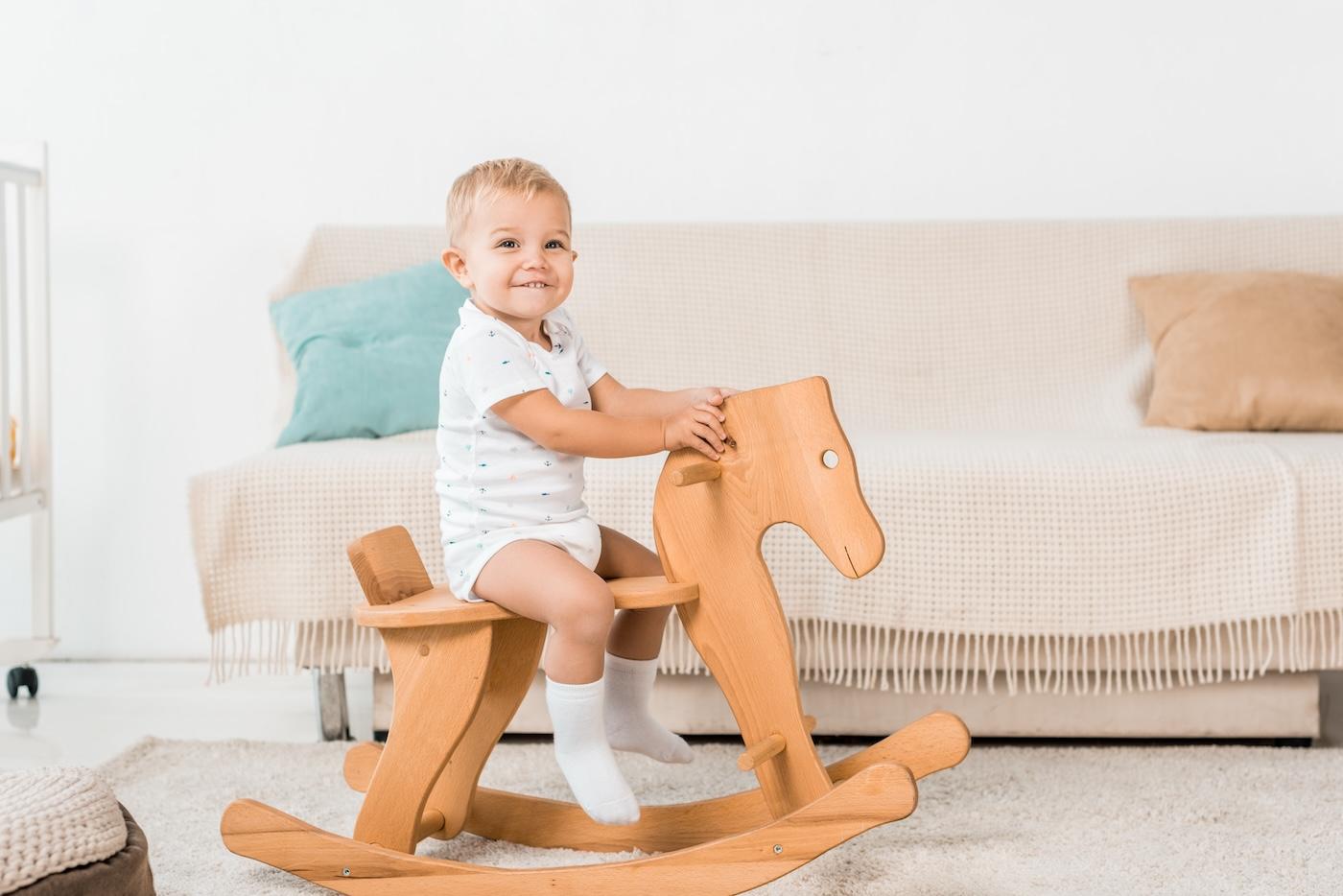BABY
Sleep Schedule for Your Baby’s First Year
Many parents just expect sleep to get better with time...not so fast!

Written by
Dr. Harvey Karp

All parents want their newborns to sleep well. However, many do not know—but want to know—the nitty gritty details: How long will my baby nap? What time should she go to sleep? How many hours of overnight sleep can I realistically expect? How does a baby's sleep schedule change over time?
Everyone knows that their newborn will not sleep a lot during the first weeks. But, the biggest new-parent misconception is that once the baby passes the first weeks, sleep gradually but consistently improves. Many expect sleep to just get better and better until the baby is sleeping an 8-hour stretch at 4 months. Not so fast! The reality, for many—if not most—babies, is a bit of a roller coaster alternating happy victories with frustrating regressions!
That said, below is a listing of what you might reasonably expect for your baby's sleep…along with descriptions of some of the common zigs and zags many newborns experience during the first year. (Please remember, each infant is unique and baby sleep schedules can vary widely.)
Birth to 2 Month Newborn Sleep Schedule
Here’s the thing with newborns: Their natural day-night circadian rhythms have yet to develop. Plus, their bellies are teeny, so they need to eat a lot, including during the night. In fact, breastfed newborns wake up to nurse about every two to three hours and formula-fed babies do so roughly every three to four hours.
Total Sleep for Newborns to 2-Month-Olds: These teeny babies sleep 14 to 18 hours a day. During the first two months, babies sleep in bits and pieces, waking throughout the day to feed. In the early weeks, you can expect your little one to fuss from hunger 10 to 12 times a day.
Wake Time for Newborns to 2-Month-Olds: Your baby’s day usually starts around 7am.
Napping for Newborns to 2-Month-Olds: Your wee sleepyhead will take lots of little naps—totaling up to eight hours a day. A newborn’s daytime wake/sleep cycle is 45 to 60 minutes of awake time, then one to two hours of napping. And for babies between 1 and 2 months old, that wake window opens a wee bit wider, landing between one and two hours.) During the second month, if your baby’s nap goes over an hour-and-a-half to two hours, it may be a good idea to wake them for a feeding. While waking a snoozing baby seems like a big no-no, know that long naps mean less eating during the day, making babies hungrier at night.
Bedtime for Newborns to 2-Month-Old: Babies this age often go down around 10pm.
Nighttime Sleep for Newborns to 2-Month-Olds: Your baby will drift on and off throughout the night, punctuated by occasional feedings. Remember, breastfed babies this age often wake to eat about every 2 to 3 hours and formula-fed babies wake about every 3 to 4 hours. This is 100% normal and to be expected!
Newborns to 2-Month-Old Sleep Tips:
- Activate Baby’s calming reflex: White noise, swaddling, and motion work wonders starting from the first day of life to help babies sleep better, naturally. That’s because these sleepytime helpers are all integral parts of the 5 S’s for soothing babies and helping them sleep. White noise (shushing), swaddling, and motion (swinging) all mimic the soothing sensations babies experience in the womb and trigger what’s known at the calming reflex, or nature’s “off switch” for crying and “on switch” for sleep.
- Consider SNOO: SNOO—the smart bassinet developed here at Happiest Baby—was designed to provide those three important S’s. SNOO provides responsive white noise and motion—and swaddling—all in one bed, to aid sleep. Don't worry, SNOO does not keep babies asleep who need to eat! Babies will always wake up and let you know when they are hungry.
2 to 4 Month Baby Sleep Schedule
By the time your baby reaches 4 months old, they will have finally sorted out their days and nights, making napping and night sleeps a bit easier. The womb-like trifecta of white noise, gentle rocking, and swaddling are still important…but one of these sleep-savers may need to stop soon. Once your baby shows signs of rolling, it’s no longer safe to swaddle them (however, you can continue to use SNOO’s special built-in swaddle which keeps babies on the back). And be warned about the possible 3-month sleep regression! It can suddenly appear, with your baby starting to wake up like a newborn—every few hours—and wanting to play or cuddle…but refusing to sleep alone.
Total Sleep for 2- to 4-Month-Olds: Two- to 4-month-old babies are still sleeping a ton, usually around 12 to 16 hours of ZZZs a day.
Wake Time for 2- to 4-Month-Olds: Your little one will most likely wake up a little earlier now. Most babies this age start their day around 6am.
Napping for 2- to 4-Month-Olds: When babies first emerge from newbornhood (between 2 and 4 months), they settle into two to three daily naps, totaling 4 to 6 hours of sleep.
Bedtime for 2- to 4-Month-Olds: Lights out shifts a bit earlier, with most babies going down around 9pm.
Nighttime Sleep for 2- to 4-Month-Olds: Babies are able to sleep a little longer now, but they still wake for a feeding or two. Longest unbroken sleep can range from around five hours to up to eight hours.
2- to 4-Month-Old Sleep Tips:
- Tweak naptime. Once your baby is 2 months old, gently wake them up if their morning or afternoon nap stretches over 1.5 to 2 hours. Long naps mean less daytime eating…making babies hungrier at night.
- Try a dream feed. Consider adding a dream feed to your nightly routine to help delay Baby’s night-waking. Here you gently rouse your baby (without fully waking them) right before you go to bed for the night (between 10pm and 12am) to feed one more time before you turn in for the night.
- Assess swaddling. At 2 to 3 months of age—or when your baby learns to roll—it’s time to stop swaddling. Without the swaddle, your baby may start to startle more, roll more, and wake many times a night. To help, it’s extra important to use white noise as a sleep cue for all naps and all nights. PS: If your baby is sleeping in SNOO, however, you can continue to safely swaddle until your little one graduates to the crib. (Our patented swaddle secures to the bed to keep babies on their back.)
4 to 8 Month Baby Sleep Schedule
When your baby passes the four-month mark, they’ve finished what I call the fourth trimester. Many of your new-parent friends may still be desperate from exhaustion. So, if your little one is a great sleeper, don’t brag too much! All babies are different.
Total Sleep for 4- to 8-Month-Olds: Your growing baby often clocks 12 to 16 hours of sleep a day.
Wake Time for 4- to 8-Month-Olds: The day starts between 6 and 8am for babies between 4- and 8-months old, depending on your baby, of course!
Napping for 4- to 8-Month-Olds: Babies this age may still be eking out three naps a day or they may have settled into a comfortable two-nap schedule, totaling 3 to 5 hours of sleep a day.
Bedtime for 4- to 8-Month-Olds: Night-night often starts around 7 to 9pm.
Nighttime Sleep for 4- to 8-Month-Olds: Your baby may have unbroken sleep of 6 to 10 hours, which most anyone would call “sleeping through the night!”
4- to 8-Month-Old Sleep Tips
- Continue with the 5 S’s. At around 4 months old, your baby’s natural calming reflex fades…but don’t worry! Once you start using white noise in the background during your baby’s bedtime routine, they’ll start to expect it and make the connection that white noise means sleepytime is here. That means every time you turn on white noise, your baby thinks, “Hey, I know that sound! It must mean it’s time to sleep.” (It’s like magic!)
- Help with teething. Teething commonly starts between 4 to 6 months, but like everything, your baby may be earlier or later to the game. Gum pain can make your baby fussier and disrupt sleep. Loud, rumbly white noise can be very helpful to help your baby tune out distractions, both internal, like teething, and external, such as sudden noises.
- Make your crib transition go smoothly. Around 6 months, many parents decide to move their babies to their own room, where they'll sleep in a crib instead of a bassinet!
8 to 12 Month Baby Sleep Schedule
Baby sleep is a little like a roller coaster with it’s ups and downs, thrills, and scaries. And right now, smack in the second half of your baby’s first year, a frightening dip might be fast approaching! (You can read more about the 8-month sleep regression here.) At this age, some little ones start developing separation anxiety and bedtime and others are so excited about their newly developing skills, that they find it more difficult to settle down.
Total Sleep for 8- to 12-Month-Olds: By the time your baby hits 8 months, they should be snoozing between 12 to 16 hours a day.
Wake Time for 8- to 12-Month-Olds: The day often starts around 6 to 7am for these tots.
Napping for 8- to 12-Month-Olds: Your little one will likely still be taking two naps a day. For some babies, those naps are brief (we’re talking 30 minutes), while other babies may nap for up to 2 hours at this age.
Bedtime for 8- to 12-Month-Olds: Baby's bedtime often falls somewhere between 7 and 9pm now.
Nighttime Sleep for 8- to 12-Month-Olds: Your baby's longest stretch is likely a glorious 7 to 10 hours a night! Wooo!
8- to 12-Month-Old Sleep Tips
- Tackle hunger. If you think a hungry tummy is the root of your tot’s wake-ups, add some extra fat during your evening feeds. For instance, try avocado or a smidge of olive oil or butter mixed into their baby food). And make sure your child is getting enough breastmilk or formula during the day.
- Offer extra pacifiers. For babies who use pacifiers, placing a few extra pacifiers in their crib for naps and night sleeps can make it easy for them to get comfort when they need it. (Sucking lowers heart rate, blood pressure, and stress levels.)
- Consider a nightlight. While a dark bedroom is very important for sleep, sometimes a nightlight positioned a distance from your baby’s sleep space can help an older baby sleep. (When they wake up, they’ll see their familiar room…not an endless abyss!)
12 Month (1 Year) Baby Sleep Schedule
Happy birthday to your little one! You made it through an entire year—and many sleep cycles. You’re now entering a whole new stage of sleep—toddler sleep!
Total Sleep for 12-Month-Olds: At 1 year old, most babies sleep 12 to 16 hours in a full day’s cycle.
Wake Time for 12-Month-Olds: Rise and shine often occurs between 6 and 7am.
Napping for 12-Month-Olds: Your little one is likely still clocking two naps a day, totaling two to four hours. (FYI: Most babies drop the second nap between 12 and 24 months.)
Bedtime for 12-Month-Olds: Now your “big kid” will be hitting the hay between 7 and 9pm…early enough for the grownups to get some alone time!
Nighttime Sleep for 12-Month-Olds: The longest sleeping stretch for 12-month-olds usually averages 7 to 10 hours at night.
12-Month-Old Sleep Tips:
- Communicate differently. Communicating with kids this age requires a whole new set of tools and expectations. And figuring this out will make bedtime easier. For starters, explore the ins and outs of Toddler-ese and bedtime sweet talk. (You’ll find more fast-acting tips to boost sleep—and reduce tantrums—in the bestselling The Happiest Toddler on the Block.
- Offer a lovey. You can now introduce a lovey to your tiny tot! Loveys are fantastic go-to-sleep helpers, offering toddlers much-needed comfort, confidence, and security. In fact, the American Academy of Pediatrics even attests that every child “needs” a comfort object in their early years for emotional support. (Try SNOObear, which does double duty as a lovey and a white noise machine.)
- Be flexible. One-year-olds (and days with 1-year-olds) can be unpredictable. So, if your bub is a two-naps-a-day kid, but only got one, offer a slightly earlier bedtime on those days. In general, consider lengthening your tot’s wake window between naps and see how that goes before rushing to a fixed one-nap-a-day schedule.
Final Thoughts on Baby Sleep Schedules
Every baby is different, so your little one’s schedule might vary slightly from the ones outlined above. However, if you’re armed with the right information and resources, you should be snoozing sweetly in no time!
Disclaimer: The information on our site is NOT medical advice for any specific person or condition. It is only meant as general information. If you have any medical questions and concerns about your child or yourself, please contact your health provider. Breastmilk is the best source of nutrition for babies. It is important that, in preparation for and during breastfeeding, mothers eat a healthy, balanced diet. Combined breast- and bottle-feeding in the first weeks of life may reduce the supply of a mother's breastmilk and reversing the decision not to breastfeed is difficult. If you do decide to use infant formula, you should follow instructions carefully.
SHARE THIS ARTICLE
PARENT PICKS
Bestsellers



















